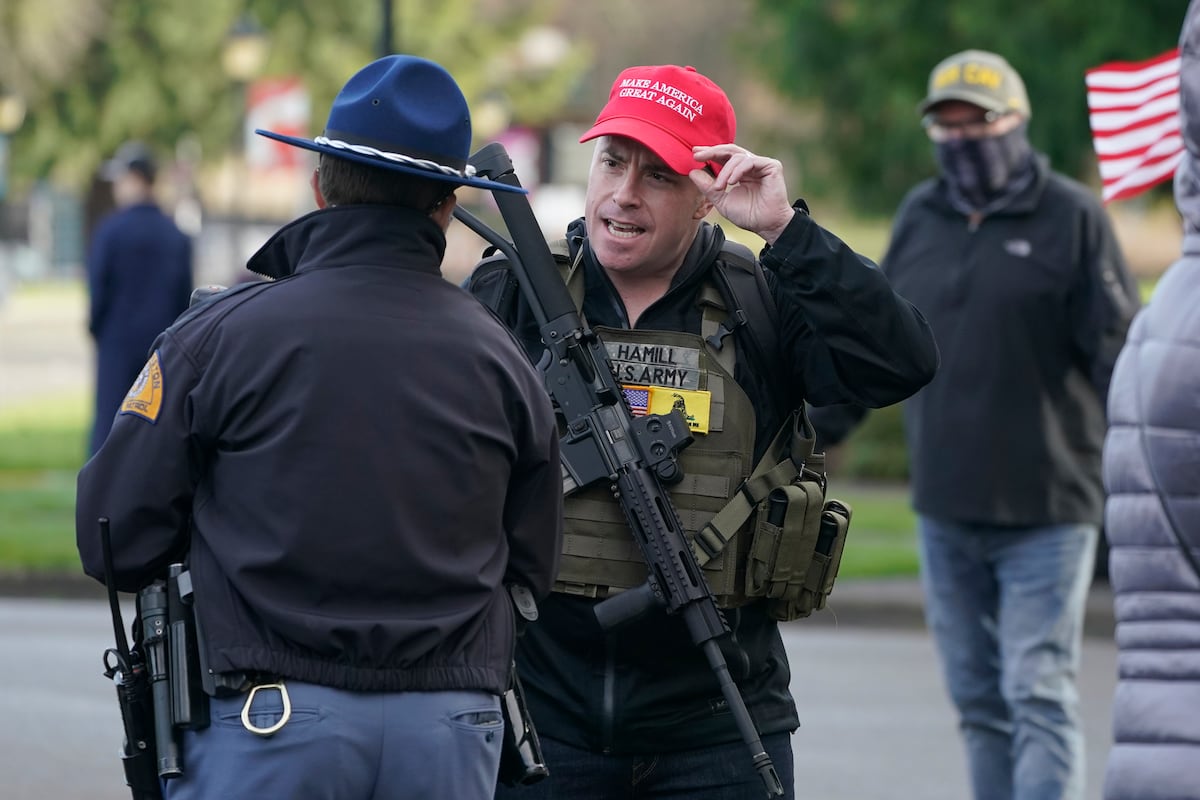Following the attack on the U.S. Capitol on Jan. 6, 2021, where about 15% of the rioters were veterans or service members, the Pentagon launched an effort to root out extremism from the ranks and prevent anyone with a bent toward political violence from joining the military.
After the past four years, experts in extremism prevention deemed those efforts incremental at best and perfunctory at worst. Political opposition “very much slowed things down,” said Kate Bitz, a senior organizer at the Western States Center, and lawmakers from both parties protested there was too much “gray area” in new anti-extremism policies.
But even the piecemeal progress since 2021 is more than can be expected out of Pentagon leadership in 2025, said Bitz, as well as leaders from the Global Project Against Hate and Extremism and Human Rights First.
President Donald Trump’s administration will “take the military back to the days when extremism in its entirety was ignored,” said Wendy Via, co-founder of the Global Project Against Hate and Extremism.
RELATED
Efforts to dismantle systems that track and report instances of extremism in the military could be led by Pete Hegseth, a staunch opponent of diversity, equity and inclusion policies — and Trump’s pick for Defense Secretary. Hegseth has compared the Pentagon’s extremism policies to a “purge” and a “sham.” Hegseth said he intends to fire “woke” military leaders, a plan that Via believes will create an environment of distrust inside the Pentagon.
His opposition to the Pentagon’s extremism-prevention efforts is partly personal. The Associated Press reported that a fellow service member flagged Hegseth, an Army National Guard veteran, as an “insider threat” because one of his tattoos was associated with the white supremacist movement.
“In the future when it comes to the DOD’s approach, there’s every possibility that extremist elements will not just be ignored, but to some degree embraced,” Witz said. “These are groups that intentionally attempt to recruit veterans who bring military skills into bigoted movements. And many white nationalist and anti-democracy groups also advocate that members enter the military in order to gain these kind of skills. So, I suppose that’s a rather bleak picture.”
The Defense Department Office of Inspector General reported in 2023 that the Pentagon investigated 183 allegations of extremist activity among service members that year, including 78 cases of troops advocating for the overthrow of the U.S. government. The watchdog prefaced the report by flagging that the services weren’t tracking and reporting data accurately, which meant those numbers didn’t include all cases.
RELATED

This summer, the services took steps to standardize the system for how it reports cases of extremism to the IG’s office. Hanah Stiverson, the associate director of democracy protection at Human Rights First, worries that funding to that system will be cut.
“Clear data and implementation of anti-extremism efforts is critical for national security,” Stiverson said.
Before Trump takes office next month, Congress is already poised to defund at least some of the Pentagon’s extremism-prevention initiatives. The House and Senate approved the annual military spending package this month, which includes a measure to prohibit leaders from spending any of the $895 billion going to the military on the Countering Extremism Working Group. President Joe Biden signed the measure into law Monday.
The Countering Extremism Working Group was formed after Jan. 6, 2021, and it offered dozens of recommendations to the Pentagon for how to address extremism in the ranks. Via thinks it’s likely the recommendations will not be implemented.
“There’s no question that the 2024 NDAA contributes to the undermining of the idea that extremism in the military needs to be appropriately addressed,” Via said.
This story was produced in partnership with Military Veterans in Journalism. Please send tips to [email protected].
Nikki Wentling covers disinformation and extremism for Military Times. She’s reported on veterans and military communities for eight years and has also covered technology, politics, health care and crime. Her work has earned multiple honors from the National Coalition for Homeless Veterans, the Arkansas Associated Press Managing Editors and others.
Read the full article here








